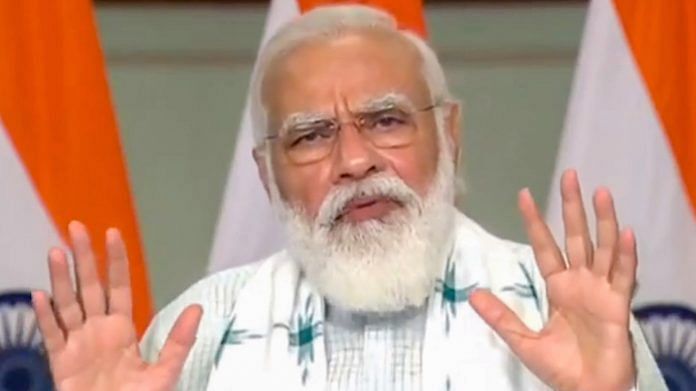New Delhi: Prime Minister Narendra Modi Monday said the new National Education Policy (NEP) is the “policy of the country and not of the government”, adding that his government had involved all stakeholders in formulating it.
The remarks were part of his inaugural address at the governors’ conference to discuss the NEP. The virtual conference organised to discuss the effective implementation of the policy, released in July, was also attended by President Ram Nath Kovind, Education Minister Ramesh Pokhriyal Nishank and education ministers and governors of various states.
“The education policy is more of the parents, teachers and students and less of the government…”, Modi said. “This policy is not the policy of the government, it is the policy of the country… just like a foreign policy is a country’s policy and defence policy is a country’s policy, the education policy is also the country’s policy.”
He said the policy aims to address the social and economic imperatives of 21st century India, and will shape the vision of Atmanirbhar Bharat.
Modi also pressed for the effective implementation of the policy. The Prime Minister has asked all universities and colleges to organise virtual conferences before 25 September to understand the policy better and discuss its effective implementation.
He had earlier spoken about the need for effective implementation of the policy during his address to over 1,000 vice-chancellors at a conclave organised in the first week of August.
Work in coordination with Centre, President tells states
President Kovind, on the other hand, urged state governments to work in coordination with the central government for better implementation of the policy.
Addressing the inaugural session of the conference, Kovind said, “Education is in the concurrent list of subjects, hence the effective implementation of education policy will depend on both state and central governments. They should work in coordination with each other to achieve effective results.”
He also listed various steps, which according to him should be immediately taken by the state governments. “The goal has been set to establish at least one multi-disciplinary institute near every district in deprived areas by the year 2030. States will need to take a number of steps for this,” he added.
The President also spoke about educational tourism and urged the state governments to identify places in their states where children can be taken for educational excursions.
“Education should be imparted through tourism as well,” he said. “I urge the state governments to identify spots in their respective states where students can be taken for an excursion. This step will also promote tourism in the state.”
Kovind, who is the Chancellor for all central universities, said institutions need to expedite the process of filling vacancies of vice-chancellors and teachers for effective implementation of education policy.
Also read: A year with no new doctors or engineers in India — that’s what delaying NEET/JEE will do



